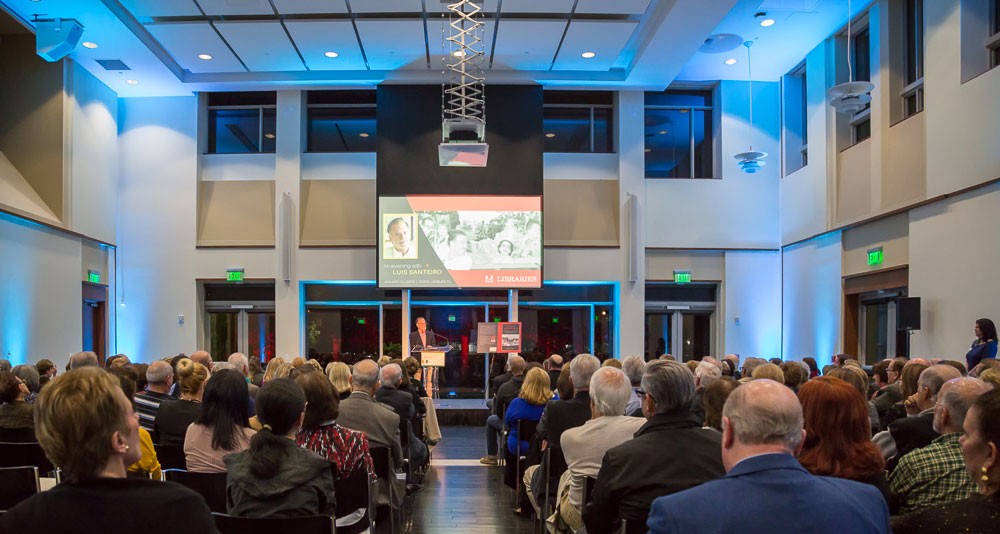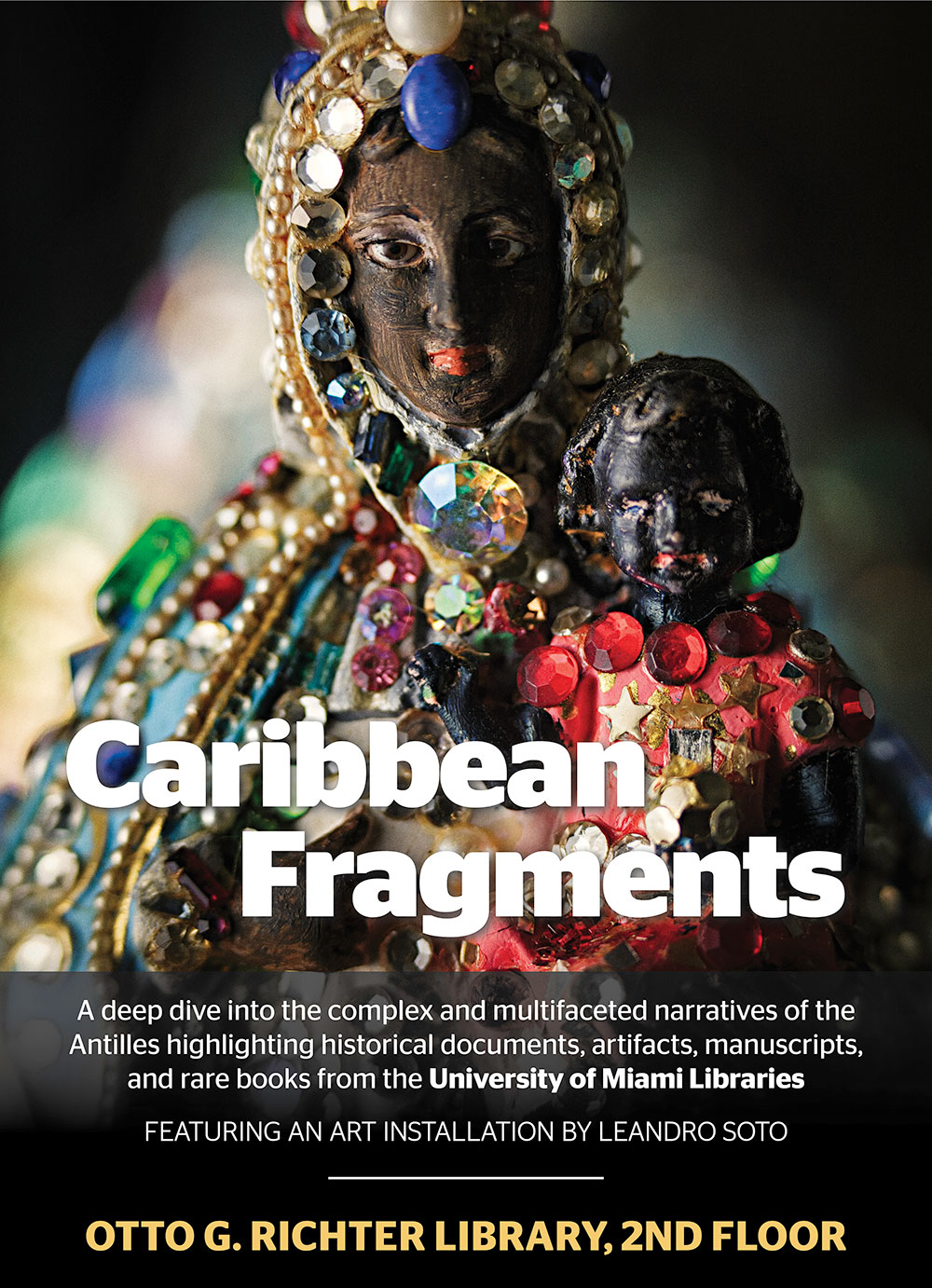|
|
|
|
Luis Santeiro, ¿Qué Pasa, U.S.A.? Writer, Shares His Recent Memoir
The Cuban Heritage Collection (CHC) hosted Emmy Award-winning writer Luis Santeiro to speak about his new memoir, Dancing with Dictators: A Family's Journey from Pre-Castro Cuba to Exile in the Turbulent Sixties, at the Robert and Judi Prokop Newman Alumni Center on
January 31, 2018. Originally scheduled to be held at the Roberto
C. Goizueta Pavilion in the Otto G. Richter Library, the event was
moved due to an overwhelming response to the announcement of
Mr. Santeiro's presentation.
Born in Havana, Cuba, Santeiro moved to Miami with his family when he
was 12. A long-time resident of New York City, he received awards as a
writer for Sesame Street and ¿Qué Pasa, U.S.A.?, the first bilingual sitcom on national television. The CHC holds the Luis Santeiro Papers, including original ¿Qué Pasa, U.S.A.? scripts and several of his published plays.
The book talk was announced and promoted via Facebook and Instagram. A live stream video of the event is available on Facebook for those who could not attend or were unable to secure a ticket.
Read more about the event here. View photos here.
|
|

|
|
Group image (from left): Tico Torres, Luis Santeiro, Alexis
Rodríguez-Duarte. The portrait of Luis Santeiro on the book cover was
taken by Alexis Rodríguez-Duarte in collaboration with Tico Torres.
|
|
Coming Soon: October 2018
This fall the CHC will once again host New Directions in Cuban Studies,
a multidisciplinary conference held every two years to disseminate the
work of graduate students and emerging scholars and survey the current
status of Cuban and Cuban American Studies.
|
|
NOW ON VIEW | Exhibitions Worth Seeing
|
|
 On display at the Richter Library through summer 2018, Caribbean Fragments is an exhibition developed in partnership with University Communications on the occasion of the publishing of Cuba and the Caribbean: A University of Miami Special Report. The exhibit takes
a deep dive into the complex and multifaceted narratives of the
Antilles by highlighting historical documents, artifacts, manuscripts
and rare books from the UM Libraries' Cuban Heritage Collection, Special
Collections, University Archives, and the Marta and Austin Weeks Music
Library. The materials provide a point of departure from and reflection
on the rigorous work of research and the creation of new
hemispheric insights. On display at the Richter Library through summer 2018, Caribbean Fragments is an exhibition developed in partnership with University Communications on the occasion of the publishing of Cuba and the Caribbean: A University of Miami Special Report. The exhibit takes
a deep dive into the complex and multifaceted narratives of the
Antilles by highlighting historical documents, artifacts, manuscripts
and rare books from the UM Libraries' Cuban Heritage Collection, Special
Collections, University Archives, and the Marta and Austin Weeks Music
Library. The materials provide a point of departure from and reflection
on the rigorous work of research and the creation of new
hemispheric insights.
|
|
|
The Library's second floor and Roberto C.
Goizueta Pavilion have been reimagined as a seascape, where fragments of
culture and communication are located within a fluid, ever-changing
ocean that connects each Caribbean nation. Visiting artist Leandro Soto,
who specializes in set and costume design, has created an
installation that unites Caribbean visions and asks viewers to navigate
their own experiences and emotions when confronted with the materials on
display.
|
|
SAVE THE DATE: Thursday, April 26, 2018 | 6. p.m.
Roberto C. Goizueta Pavilion
Otto G. Richter Library, 2nd floor
Lillian Manzor, Ph.D.,
associate professor and chair of University of Miami's Department of
Modern Languages and Literatures, will join Leandro Soto at the Richter
Library on Thursday, April 26 to discuss his installation and the Caribbean Fragments exhibit materials—some of which are from his papers housed at the CHC. Dr. Manzor has worked closely with the UM Libraries as the co-curator for the Cuban Theater in Miami: 1960-1980 exhibit and Founding Director of the Cuban Theater Digital Archive. She presented a ten-minute 'Cane Talk in 2017 where she spoke about the project.
|
|
|
Antillean Visions: Maps and the Making of the Caribbean
CHC maps on exhibit at the Lowe Art Museum through May 27
|
|
Can you remember a time before our phones
guided us to our destinations using GPS technology and voice commands?
If so, you also remember the historical power of maps in charting
our movements, recording our history, and helping to shape our
identities.
On view through May 27 at the Lowe Art Museum, Antillean Visions: Maps and the Making of the Caribbean displays
nearly 200 rare, beautiful, and historically significant maps of the
Caribbean. The exhibit includes maps on loan from the Cuban Heritage
Collection, Special Collections, and the recently donated Jay I. Kislak
Collection of the Early Americas, Exploration and Navigation to
bring together fascinating views of the region, produced by some of
the most famous mapmakers of the past five centuries.
These gorgeous, one-of-a-kind pieces provide the viewer a visual
meditation on colonial and post-colonial politics, the Caribbean's
unique economic history, indigenous and hybrid cultural productions, and
aesthetic visions of the region including its long tradition as a
tourist paradise.
If you are interested in a guided tour of the exhibit please contact mvey@miami.edu.
|
|
Plan Your Visit to the Roberto C. Goizueta Pavilion
Home of the largest collection of its kind outside of Cuba
|
|
The Cuban
Heritage Collection collects, preserves, and provides access to primary
and secondary sources of enduring historical, research, and
artifactual value relating to Cuba and the Cuban diaspora from
colonial times to the present. The Collection supports the
teaching, learning, and research needs of the University of Miami and
the broader scholarly community.
The CHC preserves its treasures and carries
out its programs in the Roberto C. Goizueta Pavilion, named in honor of
the late Cuban-American business leader. The Pavilion is a
10,000-square-foot facility located on the second floor of the Otto G.
Richter Library at the University of Miami's Coral Gables campus.
Interested in touring the Cuban Heritage
Collection? The Pavilion is open Monday through Friday from 9 a.m.
to 4 p.m. Please e-mail chc@miami.edu or call 305-284-4900 to schedule a tour.
|
|
Members of Miami's Cuban community recognized the uniqueness of the Cuban Heritage Collection and in 1995 formed the Amigos, a membership group that raises funds to support the Collection's mission.
The Amigos are committed to supporting the mission of the CHC and
through membership dues and other fundraising efforts, they contribute
directly to the Collection's programs. The Amigos support CHC
initiatives and help provide funding for the Goizueta Foundation
Graduate Fellowships, oral history projects, digitization efforts,
and special events. These contributions are part of the Amigos history
of giving since the organization was founded.
Each Amigos membership helps ensure the CHC can continue to preserve the
collections, services, and programs of the department. To join the
Amigos, please download and complete this form.
If you have any questions, please write to amigos@miami.edu or call 305-284-4900.
|
|
|
|
|
| |